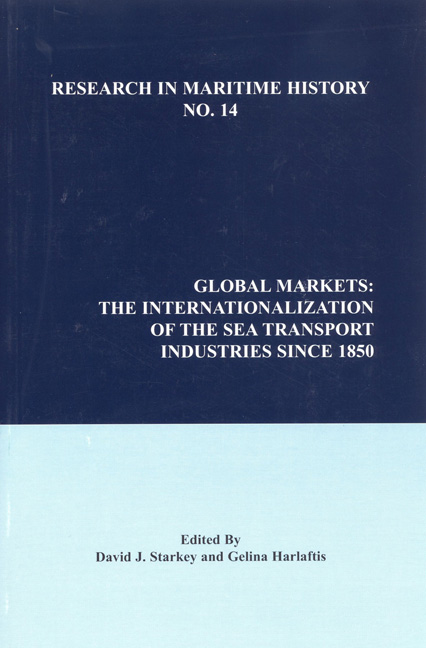Book contents
- Frontmatter
- Contents
- About the Editors
- Contributors
- Introduction
- “International Freight Markets in the 1830s and 1840s: The Experience of a Major Finnish Shipowner”
- “The First (and Very Secret) International Steamship Cartel, 1850-1856”
- “Competition or Co-operation in the Global Shipping Industry: The Origins and Impact of the Conference System for British Shipowners before 1914”
- “National Alliances and Global Webs: The Internationalization of Japanese Shipping”
- “Dutch Sea Transport in Transition: The German Hinterland as Catalyst, 1850-1914”
- “The Expansion of American Interests in Transatlantic Commerce and Trade, 1865-1893”
- “The Expansion of Japan's Shipping Interests before the Sino-Japanese War”
- “Cooperation and Reorganization on the North-South Routes from Japan in the Interwar Period”
- “The Global Communications Industry and Its Impact on International Shipping before 1914”
- “The Nineteenth-Century Roots of Globalization: Some Technological Considerations”
- “The Global Fish Market: Internationalization and Globalization, 1880-1997”
- “Convergence or National Styles? The Japanese Challenge to the British-Norwegian Hegemony in the Twentieth-Century Whaling Industry”
- “International Trends and Greek Shipping: The Business Strategy of Demetrios Moraitis, 1893-1908”
- “Organizational and Managerial Patterns of Greek- Owned Shipping Enterprises and the Internationalization Process from the Internar Period to 1990”
- “Internationalization and the Collapse of British Shipbuilding, 1945-1973”
- “Globalization and International Competitiveness: The Experience of the Japanese Shipping Industry since the 1960s”
- “Containerization and the Globalization of Liner Shipping“
“The Expansion of Japan's Shipping Interests before the Sino-Japanese War”
- Frontmatter
- Contents
- About the Editors
- Contributors
- Introduction
- “International Freight Markets in the 1830s and 1840s: The Experience of a Major Finnish Shipowner”
- “The First (and Very Secret) International Steamship Cartel, 1850-1856”
- “Competition or Co-operation in the Global Shipping Industry: The Origins and Impact of the Conference System for British Shipowners before 1914”
- “National Alliances and Global Webs: The Internationalization of Japanese Shipping”
- “Dutch Sea Transport in Transition: The German Hinterland as Catalyst, 1850-1914”
- “The Expansion of American Interests in Transatlantic Commerce and Trade, 1865-1893”
- “The Expansion of Japan's Shipping Interests before the Sino-Japanese War”
- “Cooperation and Reorganization on the North-South Routes from Japan in the Interwar Period”
- “The Global Communications Industry and Its Impact on International Shipping before 1914”
- “The Nineteenth-Century Roots of Globalization: Some Technological Considerations”
- “The Global Fish Market: Internationalization and Globalization, 1880-1997”
- “Convergence or National Styles? The Japanese Challenge to the British-Norwegian Hegemony in the Twentieth-Century Whaling Industry”
- “International Trends and Greek Shipping: The Business Strategy of Demetrios Moraitis, 1893-1908”
- “Organizational and Managerial Patterns of Greek- Owned Shipping Enterprises and the Internationalization Process from the Internar Period to 1990”
- “Internationalization and the Collapse of British Shipbuilding, 1945-1973”
- “Globalization and International Competitiveness: The Experience of the Japanese Shipping Industry since the 1960s”
- “Containerization and the Globalization of Liner Shipping“
Summary
East Asian waters were increasingly integrated into the international steamship network from the mid-nineteenth century. Before the Sino- Japanese War (June 1894-November 1895), this network was in the tight grip of European — British, French, German, Dutch and Scandinavian — and American shipping firms. The entry of Japanese shipping into this business began immediately after the Sino-Japanese War, with the establishment by Japanese shipowners of major lines to Europe, Seattle, San Francisco and Australia. At the same time, once the war had ended in 1895, Japan joined the imperialist race in the Far East.
The development of Japanese shipping has often been seen as a factor in this imperialist expansion. This chapter does not argue that Japanese shipping was unrelated to imperialism. However, the relationship between Japanese imperialism and shipping has been somewhat misunderstood, especially by those aware of the western historical experience. Since the Age of Discovery, Europe's maritime power had overwhelmed other countries, with empires expanding all over the world and shipping becoming an important instrument in the extension of imperial possessions and commerce. This pattern led many to assume that the growth of shipping could not be divorced from imperialism. Nevertheless, modern shipping is basically a commercial activity and we should not presuppose that strong, mutually stimulating links inevitably exist between shipping and imperialism. In describing and explaining Japan's enthusiasm for the expansion of its shipping industry before the Sino-Japanese War, this chapter emphasizes the purely commercial aspects of this form of maritime development. Thus, if international economic relations can be divided into two parts — ordinary trade and emigration on the one hand, and an incursion into the sovereignty of another state to control its economy on the other — Japan's efforts to build up its shipping interests before the Sino-Japanese War clearly belong in the former category.
To understand the motives behind the establishment of Japan's first overseas lines, we need to consider the period before the 1894-1895 war, when various groups lobbied for the promotion of international shipping — notably, shipping companies, House of Representatives, government, and influential sectors of public opinion as evidenced by a series of contemporary, prize winning essays on shipping. Examination of these pro-shipping sentiments reveals that it was business rather than imperialism that provided the initial impetus to the growth of Japanese shipping.
- Type
- Chapter
- Information
- Global MarketsThe Internationalization of The Sea Transport Industries Since 1850, pp. 149 - 162Publisher: Liverpool University PressPrint publication year: 1998

